Aging is an inevitable part of life, but that doesn’t mean you can’t help your body stay as youthful and vibrant as possible. A balanced diet, regular exercise, and sufficient sleep are cornerstones of healthy aging. However, certain vitamins are especially valuable for supporting the body’s natural defenses against the visible and invisible signs of aging. In this article, we will explore the top five vitamins that can help you look and feel younger, along with tips on how to incorporate them into your daily routine. Whether you’re looking to minimize wrinkles, maintain strong bones, or improve your overall vitality, these vitamins are a great place to start.
1. Vitamin A
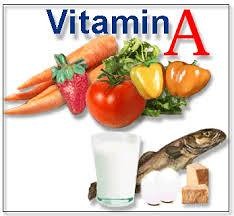
Why It’s Important
Vitamin A, often referred to as retinol when used in skincare products, is essential for healthy skin, vision, and immune function. It’s particularly known for its role in supporting cell turnover and collagen production, two critical processes for preventing and reducing the appearance of fine lines and wrinkles. By encouraging new cell growth, Vitamin A helps your skin appear smoother and more radiant over time.
Sources of Vitamin A
You can find Vitamin A in both animal and plant-based sources. Animal-based sources provide retinol, the active form of Vitamin A, whereas plant-based sources supply beta-carotene, which your body can convert into Vitamin A as needed. Some of the best dietary sources include:
- Animal-based sources: Liver, fish oil, and dairy products like milk and cheese.
- Plant-based sources: Carrots, sweet potatoes, spinach, kale, and other leafy green vegetables.
Incorporating Vitamin A Into Your Diet
- Enjoy a bowl of carrot soup or roast sweet potatoes for dinner.
- Add a handful of spinach or kale to your smoothie.
- Consider Vitamin A supplements if you struggle to get enough from food alone, but consult a healthcare professional to ensure you don’t exceed recommended doses.
2. Vitamin C
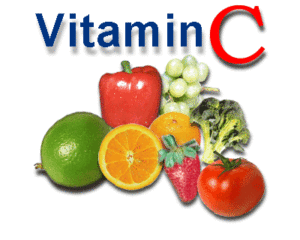
Why It’s Important
Vitamin C is one of the most powerful antioxidants available. It helps combat free radicals—unstable molecules that damage cells and contribute to aging and disease. By neutralizing free radicals, Vitamin C supports overall cellular health and resilience. Additionally, it boosts collagen synthesis, playing a major role in maintaining skin elasticity and reducing the appearance of wrinkles. It also aids in wound healing and supports a robust immune system.
Sources of Vitamin C
You can get Vitamin C primarily from fresh fruits and vegetables. Keep in mind that cooking can reduce Vitamin C content, so try to enjoy some of these foods raw or lightly cooked:
- Citrus fruits (oranges, lemons, grapefruits)
- Berries (strawberries, blueberries, raspberries)
- Kiwi
- Bell peppers
- Broccoli
- Brussels sprouts
Tips for Getting More Vitamin C
- Start your day with a glass of fresh orange juice.
- Snack on berries or sliced bell peppers for a nutrient-packed pick-me-up.
- Consider using a topical Vitamin C serum in your skincare routine to maximize its antioxidant effects on the skin’s surface.
- Add a dash of lemon juice to your salads, soups, or water to give your meal and hydration a Vitamin C boost.
3. Vitamin E
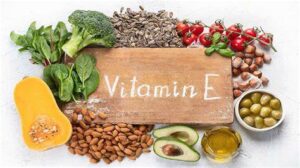
Why It’s Important
Vitamin E is another potent antioxidant that helps protect the skin from oxidative stress, which can accelerate the aging process. Additionally, Vitamin E supports healthy cell function and helps maintain the integrity of cell membranes, reducing the likelihood of collagen breakdown. Together, Vitamins C and E work synergistically, so getting enough of both is a powerful way to support youthful skin.
Sources of Vitamin E
Vitamin E is abundant in various foods, especially in certain fats and oils:
- Almonds, sunflower seeds, hazelnuts
- Avocados
- Vegetable oils (such as sunflower and safflower oil)
- Spinach and other leafy greens
Getting the Most Out of Vitamin E
- Snack on a handful of almonds or sunflower seeds.
- Use nutrient-rich oils like olive oil or sunflower oil in cooking and salad dressings.
- Look for facial moisturizers and serums containing Vitamin E.
- Combine Vitamin E and Vitamin C supplements for enhanced antioxidant protection.
4. Vitamin D
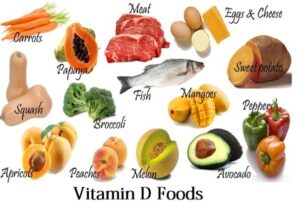
Why It’s Important
Vitamin D is known as the “sunshine vitamin” because our bodies can synthesize it when the skin is exposed to sunlight. Adequate Vitamin D levels are crucial for bone health, immune function, and calcium absorption. As you age, your ability to produce Vitamin D from sunlight decreases, making it all the more important to ensure you get enough through diet or supplements. Low Vitamin D levels can lead to weaker bones, reduced muscle strength, and a higher risk of age-related health issues. In addition, some studies have suggested a link between Vitamin D deficiency and skin issues, further underlining its significance for healthy aging.
Sources of Vitamin D
- Exposure to sunlight (about 10-30 minutes a day, depending on your skin type and local UV index)
- Fatty fish like salmon, mackerel, and sardines
- Fortified dairy products and plant-based milks
- Egg yolks
- Mushrooms exposed to ultraviolet (UV) light
Maintaining Healthy Vitamin D Levels
- Spend short periods of time outdoors in the morning or late afternoon sun, wearing sunscreen as appropriate for longer exposures.
- Include fatty fish in your meals at least twice a week.
- Use fortified dairy or plant-based milk if you’re avoiding traditional dairy.
- Take Vitamin D supplements if recommended by your doctor, especially during winter months or if you spend little time in the sun.
5. Vitamin K
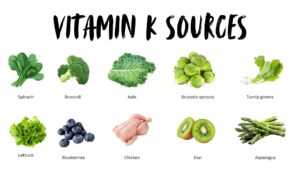
Why It’s Important
Vitamin K is not as frequently mentioned in the context of anti-aging as Vitamins A, C, D, and E, but it plays a vital role in blood clotting, bone health, and overall cardiovascular function. Proper blood clotting supports quicker healing, while strong bones are crucial for maintaining mobility and quality of life as you age. Vitamin K also contributes to healthy circulation, which is essential for delivering nutrients to your skin and other tissues, supporting their rejuvenation and vitality.
Sources of Vitamin K
There are two main forms of Vitamin K: K1 (phylloquinone), commonly found in plant foods, and K2 (menaquinone), often found in fermented foods and animal-based products.
- Leafy green vegetables (kale, spinach, collard greens)
- Broccoli, Brussels sprouts
- Fermented foods like natto (a traditional Japanese dish made from soybeans)
- Some cheeses, particularly aged varieties
- Egg yolks
How to Boost Your Vitamin K Intake
- Incorporate salads with leafy greens into your daily meals.
- Experiment with fermented foods like natto, kimchi, or sauerkraut.
- Try adding broccoli or Brussels sprouts as side dishes throughout the week.
- Ask a healthcare provider if a Vitamin K2 supplement is suitable for you, especially if you are concerned about bone health.
Practical Tips for Maximizing the Anti-Aging Benefits of Vitamins
- Eat a Balanced Diet
While focusing on specific vitamins is helpful, don’t forget that synergy among different nutrients is key to optimal health. A balanced diet rich in whole grains, lean proteins, healthy fats, and a variety of fruits and vegetables provides a wide spectrum of micronutrients. - Consider Supplements Wisely
Sometimes, even a well-rounded diet may fall short, especially if you have dietary restrictions or certain health conditions. In these situations, supplements can help fill nutritional gaps. However, always consult with a healthcare professional before starting any supplement regime to avoid overconsumption or interactions with medications. - Practice Good Skincare
Along with a nutrient-rich diet, a consistent skincare routine can help maintain a youthful complexion. Look for products containing vitamins like A (retinol), C, and E to support skin elasticity, reduce oxidative damage, and enhance your natural glow. - Stay Hydrated
Drinking enough water each day helps flush out toxins, keeps your skin moisturized, and maintains overall health. Proper hydration also allows water-soluble vitamins (like Vitamin C and B-complex vitamins) to travel efficiently through the body. - Exercise Regularly
Physical activity improves circulation and supports healthy weight management, cardiovascular health, and mental well-being—all of which contribute to a more youthful appearance. Aim for at least 150 minutes of moderate-intensity exercise per week, or 75 minutes of vigorous activity, combined with strength training for optimal results. - Prioritize Rest
Sleep is a critical time for the body to repair itself. Poor sleep accelerates signs of aging, from under-eye bags to a heightened stress response that can harm your overall health. Strive for seven to nine hours of quality sleep per night, and consider including relaxing bedtime practices—like reading or gentle stretching—to improve your sleep quality. - Manage Stress
Chronic stress can negatively impact skin health, weaken your immune system, and accelerate aging. Incorporate stress-management techniques such as meditation, yoga, or deep breathing exercises into your daily routine.
Final Thoughts
While there’s no magic bullet for stopping the clock on aging, incorporating these essential vitamins into your daily routine can have a significant impact on how you look and feel over time. Vitamin A supports healthy cell turnover, Vitamin C fights oxidative damage, Vitamin E protects your skin’s moisture barrier, Vitamin D fortifies bone health, and Vitamin K keeps your bones strong and your circulatory system functioning optimally. When combined with a balanced diet, regular exercise, sufficient sleep, and stress management, these vitamins can help you nurture a more radiant, resilient, and youthful you.
Remember that supplements and diet alone aren’t a substitute for holistic lifestyle choices. If you have specific health concerns, always consult a healthcare professional or registered dietitian to tailor a plan that suits your individual needs. By giving your body the nutrients it craves and treating it well, you can enjoy the benefits of healthy aging—glowing skin, strong bones, and boundless energy—for years to come.
